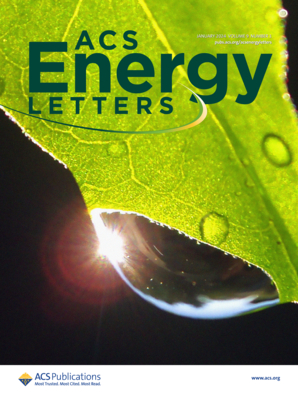All-Climate and Nonflammable Electrolyte with a Strong Anion–Solvent Interaction for High-Performance Lithium Metal Batteries
IF 19.3
1区 材料科学
Q1 CHEMISTRY, PHYSICAL
引用次数: 0
Abstract
Reinforced security and temperature tolerance are key prerequisites for the practical application of lithium metal batteries (LMBs). Achieving an optimal balance between maintaining a stable interface at a high temperature and ensuring rapid ion transport under a low temperature remains a critical challenge. Herein, an all-climate nonflammable electrolyte comprised of triethyl phosphate (TEP), lithium bis((trifluoromethyl)sulfonyl) azide (LiTFSI), and lithium nitrate (LiNO3) is proposed. The strong interaction between NO3– and TEP broadens the melting point of the electrolyte to −91.5 °C. A well-regulated lithium-ion solvation structure with low desolvation energy contributes to the formation of a durable inorganic–organic hybrid solid electrolyte interphase (SEI) and cathode electrolyte interphase (CEI), thereby enhancing the interfacial compatibility significantly. Consequently, the LMBs with the optimized TEP-based electrolyte demonstrate remarkable electrochemical performance in a wide temperature range of −60∼100 °C. The valuable insights gained from this work can offer theoretical guidance for developing wide-temperature electrolytes and high-performance LMBs.

求助全文
约1分钟内获得全文
求助全文
来源期刊

ACS Energy Letters
Energy-Renewable Energy, Sustainability and the Environment
CiteScore
31.20
自引率
5.00%
发文量
469
审稿时长
1 months
期刊介绍:
ACS Energy Letters is a monthly journal that publishes papers reporting new scientific advances in energy research. The journal focuses on topics that are of interest to scientists working in the fundamental and applied sciences. Rapid publication is a central criterion for acceptance, and the journal is known for its quick publication times, with an average of 4-6 weeks from submission to web publication in As Soon As Publishable format.
ACS Energy Letters is ranked as the number one journal in the Web of Science Electrochemistry category. It also ranks within the top 10 journals for Physical Chemistry, Energy & Fuels, and Nanoscience & Nanotechnology.
The journal offers several types of articles, including Letters, Energy Express, Perspectives, Reviews, Editorials, Viewpoints and Energy Focus. Additionally, authors have the option to submit videos that summarize or support the information presented in a Perspective or Review article, which can be highlighted on the journal's website. ACS Energy Letters is abstracted and indexed in Chemical Abstracts Service/SciFinder, EBSCO-summon, PubMed, Web of Science, Scopus and Portico.
 求助内容:
求助内容: 应助结果提醒方式:
应助结果提醒方式:


